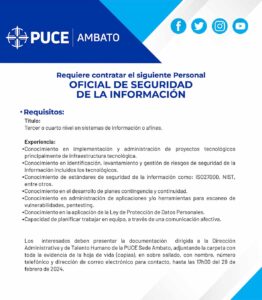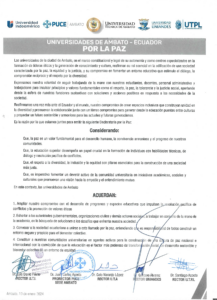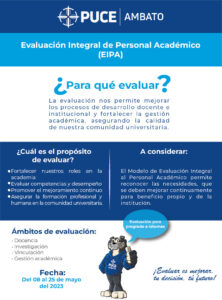Estructura Académica del Programa
Aspectos Generales
Los estudiantes que hayan cumplido con estos cuatro niveles podrán ser promovidos al programa de cursos abiertos directamente a un cuarto semestre. De no haber cumplido con el programa completo deberán someterse a un examen de ubicación. Además, se debe indicar que los estudiantes serán agrupados de acuerdo a sus edades, comprendiéndose en un mismo grupo estudiantes de 11 años, 12 años y en otro grupo estudiantes de 13 años.
Régimen de Estudios a Utilizarse.
El régimen de estudios al cual se sujetará este programa del Centro de Idiomas de la PUCESA será el de un sistema de niveles como se detalla a continuación.
Modalidad:
La modalidad será Virtual e Intensivo desarrolladas de Lunes a Viernes, como clases ordinarias distribuidas en horarios flexibles y programables a escoger por el usuario o estudiante.
Resumen de la descripción micro curricular del Idioma
Semestre o Nivel
Denominación según el nivel correspondiente dentro del Marco Común de Referencia para las lenguas:
| IDIOMA |
SEMESTRE |
DENOMINACIÓN DEL NIVEL |
ESCALA MARCO REFERENCIAL |
|
|
INGLÉS
Pre-adolecentes
|
Primero
English I |
WALKERS |
A1.2 |
A1
|
|
| Segundo
English II |
RUNNERS |
A1.2 |
|
| Tercero
English III |
FLYERS |
A2 |
A2
|
|
| Cuarto
English IV |
INTERMEDIO
|
B1.2 |
B1 |
|
| Quinto
English V |
B1.2/B2.1 |
|
|
B2 |
|
| Sexto
English VI |
INTERMEDIO ALTO |
B2.2 |
|
| Séptimo
English VII |
AVANZADO |
C.1.1 |
C1 |
|
| Octavo
English VIII |
C.1.2 |
|
NIVELES COMUNES DE REFERENCIA: ESCALA GLOBAL
| NIVEL |
Descripción |
| C1 |
Es capaz de comprender una amplia variedad de textos extensos y con cierto nivel de exigencia, así como reconocer en ellos sentidos implícitos.
Sabe expresarse de forma fluida y espontánea sin muestras muy evidentes de esfuerzo para encontrar la expresión adecuada.
Puede hacer un uso flexible y efectivo del idioma para fines sociales, académicos y profesionales.
Puede producir textos claros, bien estructurados y detallados sobre temas de cierta complejidad, mostrando un uso correcto de los mecanismos de organización, articulación y cohesión del texto. |
| B2 |
Es capaz de entender las ideas principales de textos complejos que traten de temas tanto complejos como abstractos, incluso si son de carácter técnico siempre que estén dentro de su campo de especialización.
Puede relacionarse con hablantes nativos con un grado suficiente de fluidez y naturalidad de modo que la comunicación se realice sin esfuerzo por parte de ninguno de los interlocutores.
Puede producir textos claros y detallados sobre temas diversos así como defender un punto de vista sobre temas generales indicando los pros y los contras de las distintas opciones. |
| B1 |
Es capaz de comprender los puntos principales de textos claros y en lengua estándar si tratan sobre cuestiones que le son conocidas, ya sea en situaciones de trabajo, de estudio o de ocio.
Sabe desenvolverse en la mayor parte de las situaciones que pueden surgir durante un viaje por zonas donde se utiliza la lengua.
Es capaz de producir textos sencillos y coherentes sobre temas que le son familiares o en los que tiene un interés personal.
Puede describir experiencias, acontecimientos, deseos y aspiraciones, así como justificar brevemente sus opiniones o explicar sus planes.
|
| A2 |
Es capaz de comprender frases y expresiones de uso frecuente relacionadas con áreas de experiencia que le son especialmente relevantes (información básica sobre sí mismo y su familia, compras, lugares de interés, ocupaciones, etc.)
Sabe comunicarse a la hora de llevar a cabo tareas simples y cotidianas que no requieran más que intercambio sencillos y directos de información sobre cuestiones que le son conocidas o habituales
Sabe describir en términos sencillos aspectos de su pasado y su entorno, así como cuestiones relacionadas con sus necesidades inmediatas. |
| A1 |
Es capaz de comprender y utilizar expresiones cotidianas de uso muy frecuente, así como frases sencillas destinadas a satisfacer necesidades de tipo inmediato.
Puede presentarse a sí mismo y a otros, pedir y dar información personal básica sobre su domicilio, sus pertenencias y las personas que conoce.
Puede relacionarse de forma elemental siempre que su interlocutor hable despacio y con claridad y esté dispuesto a cooperar. |
Nota: Consejo de Europa (2001) Marco común europeo de referencia para las lenguas: Aprendizaje, enseñanza, evaluación. Cambridge: Cambridge University Press.
































